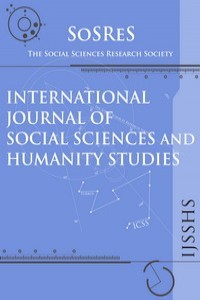THE ECONOMIC AND TECHNICAL CONTEMPORARY PARADIGM AND THE TRANSITION TO WORK OF HIGHER EDUCATION GRADUATES IN ENGINEERING, MANUFACTURING AND CONSTRUCTION
THE ECONOMIC AND TECHNICAL CONTEMPORARY PARADIGM AND THE TRANSITION TO WORK OF HIGHER EDUCATION GRADUATES IN ENGINEERING, MANUFACTURING AND CONSTRUCTION
___
- Boltanski, Luc, and Chiapello, Ève (2005), Le Nouvel Esprit du Capitalisme, France: Éditions Gallimard.
- Chaves, Miguel (2010), Confrontos com o Trabalho Entre Jovens Advogados: As Novas Configurações da Inserção Profissional, Lisboa: Imprensa de Ciências Sociais.
- Dubar, Claude (2006), A Crise das Identidades. A Interpretação de Uma Mutação, Porto: Edições Afrontamento.
- Dubar, Claude, and Gadea, Charles (1999), La promotion Sociale en France, Lille: Presses Universitaires de Septentrion.
- Ferreira, João (2001), “Teoria Geral dos Sistemas e Abordagem Sociotécnica”, (in: João Ferreira-Ed., Psicossociologia das Organizações,), Lisboa: McGraw-Hill, pp.49-75.
- Freeman, Chris, and Perez, Carlota (1988), “Structural crises of ajustement business, cycles and investment behaviour”, (in : Giovanni Dosi-Ed., Technical change and economic theory,), London: Pinter, pp. 38-66.
- Giddens, Anthony (2004), Sociologia (4.ed.), Lisboa: Fundação Calouste Gulbenkian.
- Halman, Loek (Ed.) (2001), The European values study: a third wave, The Netherlands: Tilburg University.
- Harpaz, Itzhak, and Fu, Xuanning (2002), The structure of the meaning of work: A relative stability amidst change, Human Relations, No. 5, 639-667.
- Marques, Ana Paula, e Alves, Mariana (Eds.) (2010), Inserção profissional de graduados em Portugal: (re)configurações teóricas e empíricas, Vila Nova de Famalicão: Edições Hşmus.
- Morin, Estelle, Tonelli, Maria, and Pliopas, Ana (2007), O trabalho e seus sentidos,
- ttp://www.scielo.br/pdf/psoc/v19nspe/v19nspea08.pdf [Accessed 17.11.2011] Social [online], vol.19, pp.
- 56. MOW - Meaning of Working International Research Team (1987), The meaning of working, England: University Academic Press.
- Perrenoud, Phillipe (2003), Porquê construir competências a partir da escola? Desenvolvimento da autonomia e luta contra as desigualdades, Porto: Edições ASA.
- Trist, Eric (1981), “The evolution of socio-tecnical systems, Issus in the quality of working life”, Canada: Ontário Ministry of Labour.
- Vernières, Michel (Ed.) (1997), L'insertion professionnelle: Analyses et débats, Paris: Economica.
- Başlangıç: 2009
- Yayıncı: Sosyal Bilimler Araştırmaları Derneği
DIAGNOSTICS OF RUSSIAN CONSUMER MARKET STATE IN TERMS OF DESTRUCTIVE EFFECTS INFLUENCE
BANKING SECTOR, STOCK MARKET AND ECONOMIC GROWTH: EVIDENCE FROM MENA COUNTRIES
DETERMINANTS OF FORMAL AND INFORMAL SECTOR EMPLOYMENT IN THE URBAN AREAS OF TURKEY
CLIMATE CHANGE AND SOUTH ASIAN ASSOCIATION FOR REGIONAL COOPERATION: A REGIONAL RESPONSE
Siti Aisyah Binti PANATİK, Nurul Farhana Bt Mohd NOORDİN, Roziana SHAARİ, Siti Khadijah Zainal BADRİ
CONSUMER CHARACTERISTICS IN THE INSTITUTIONAL CATERING ACCORDING TO PRIMARY RESEARCH
Mónika FODOR, ágnes CSİSZÁRİK-KOCSİR, András MEDVE
Cem Güçel, İsmail Tokmak, Hakan Turgut
THE EFFECT OF THE SUB-PRIME CRISES ON WORKPLACE SAFETY IN HUNGARY BASED ON A PRIMARY RESEARCH
Ágnes Csiszárik-Kocsir, Mónika Fodor, András Medve
CHILD ABUSE IN MALAYSIA: LEGAL MEASURES FOR THE PREVENTION OF THE CRIME AND PROTECTION OF THE VICTIM
